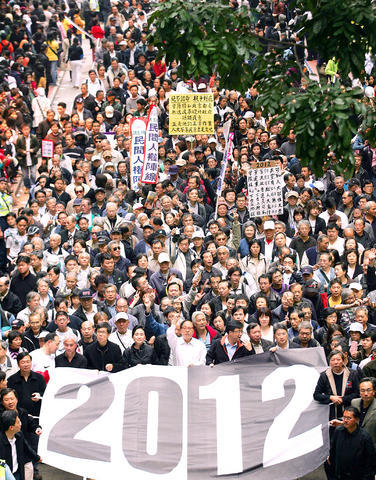Thousands marched through Hong Kong yesterday, calling for the right to elect their government by 2012 -- a date leaders in Beijing have ruled out.
The march, joined by religious, political and civil leaders, was the latest in a series of protests by residents angry that they will have to wait at least another decade before they can choose their own leader and legislators.
"We are ready now," shouted hundreds of people at Victoria Park, where they gathered waving flags, singing songs and chanting prayers before setting off on the march. Police put the number of people leaving the park at 6,800.

PHOTO: AFP
Organizers said about 20,000 people joined the march.
Li Luk-yan, 45, and his wife, Irene Siu, were in the crowd with their two young sons.
"At some point, we'll have to pass the baton to them. They need to understand what democracy means and why we need to keep fighting," Li, a publishing executive, said.
Beijing announced last month that its semiautonomous region could elect its own leader in 2017 and all of its legislators sometime after that, possibly 2020 at the earliest.
The announcement came as a bitter blow to the territory, where most had hoped for 2012. Many are also doubtful that Beijing will deliver on that pledge.
Hong Kong has a vast amount of financial and personal liberties, including the right to hold protests and criticize the government -- freedoms not allowed elsewhere in China.
Still, residents are unhappy that they cannot have a greater say in who runs their government.
Hong Kong's leader is currently chosen by an 800-member committee dominated by Beijing loyalists, including many of the city's influential tycoons. Only half of the territory's 60 lawmakers are elected, with the rest are picked by special interest groups.
"If Hong Kong's leader is elected by the people, he has to be accountable to the people, not to the business community as he is now," Li said.
Beijing has consistently ruled out allowing the booming financial center of 6.9 million people to directly elect its representatives, arguing that the territory is not yet politically mature enough to do so.
Many of Hong Kong's activists and lawmakers have been outspoken critics of human rights violations in China. Some, like the founder of the main opposition Democratic Party, Martin Lee (
A barrister-turned-lawmaker, Lee told reporters that the rally sent a strong message to Beijing that Hong Kong people wanted "real, genuine democracy."
The democrats have dismissed Beijing's announcement as an empty gesture. They say not only are there no guarantees that direct elections for the chief executive will take place in 2017, but that candidates will still need to be put forward by a nomination committee, the makeup of which has not yet been agreed.
"There are so many blanks in this proposal," Lee said. "We still don't know if we will have genuine elections for all of the legislature in 2020 or what the screening procedure will be like for the chief executive. We demand to know all the details."

US President Donald Trump yesterday announced sweeping "reciprocal tariffs" on US trading partners, including a 32 percent tax on goods from Taiwan that is set to take effect on Wednesday. At a Rose Garden event, Trump declared a 10 percent baseline tax on imports from all countries, with the White House saying it would take effect on Saturday. Countries with larger trade surpluses with the US would face higher duties beginning on Wednesday, including Taiwan (32 percent), China (34 percent), Japan (24 percent), South Korea (25 percent), Vietnam (46 percent) and Thailand (36 percent). Canada and Mexico, the two largest US trading

China's military today said it began joint army, navy and rocket force exercises around Taiwan to "serve as a stern warning and powerful deterrent against Taiwanese independence," calling President William Lai (賴清德) a "parasite." The exercises come after Lai called Beijing a "foreign hostile force" last month. More than 10 Chinese military ships approached close to Taiwan's 24 nautical mile (44.4km) contiguous zone this morning and Taiwan sent its own warships to respond, two senior Taiwanese officials said. Taiwan has not yet detected any live fire by the Chinese military so far, one of the officials said. The drills took place after US Secretary

CHIP EXCEPTION: An official said that an exception for Taiwanese semiconductors would have a limited effect, as most are packaged in third nations before being sold The Executive Yuan yesterday decried US President Donald Trump’s 32 percent tariff on Taiwanese goods announced hours earlier as “unfair,” saying it would lodge a representation with Washington. The Cabinet in a statement described the pledged US tariffs, expected to take effect on Wednesday next week, as “deeply unreasonable” and “highly regrettable.” Cabinet spokeswoman Michelle Lee (李慧芝) said that the government would “lodge a solemn representation” with the US Trade Representative and continue negotiating with Washington to “ensure the interests of our nation and industries.” Trump at a news conference in Washington on Wednesday announced a 10 percent baseline tariff on most goods

‘SPECIAL CHANNEL’: Taipei’s most important tasks are to stabilize industries affected by Trump’s trade tariffs and keep negotiations with Washington open, a source said National Security Council Secretary-General Joseph Wu (吳釗燮) arrived in the US for talks with US President Donald Trump’s administration, a source familiar with the matter said on Friday. Wu was leading a delegation for a meeting known as the “special channel,” the Financial Times reported earlier. It marked Trump’s first use of the channel since returning to the White House on Jan. 20. Citing a source familiar with the matter, the Financial Times reported that Minister of Foreign Affairs Lin Chia-lung (林佳龍) was also a part of the delegation. The visit came days after China concluded war games around Taiwan and amid Trump’s